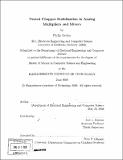Nested chopper stabilization in analog multipliers and mixers
Author(s)
Godoy, Philip (Philip Andrew)
DownloadFull printable version (8.723Mb)
Other Contributors
Massachusetts Institute of Technology. Dept. of Electrical Engineering and Computer Science.
Advisor
Joel L. Dawson.
Terms of use
Metadata
Show full item recordAbstract
We describe a general offset-cancelling architecture for analog multiplication using chopper stabilization. Chopping is used to modulate the offset away the output signal where it can be easily filtered out, providing continuous offset reduction which is insensitive to drift. Both square wave chopping and chopping with orthogonal spreading codes are tested and shown to reduce the offset down to the microvolt level. In addition, we apply the nested chopping technique to an analog multiplier which employs two levels of chopping to reduce the offset even further. We discuss the limits on the performance of the various chopping methods in detail, and present a detailed analysis of the residual offset due to charge injection spikes. An illustrative CMOS prototype of a chopper-stabilized general-purpose multiplier in a 0.18/pm process is presented which achieves a worst-case offset of 1.5/tV. This is the lowest measured offset reported in the DC analog multiplier literature by a margin of two orders of magnitude. The prototype multiplier is also tested with AC inputs as a squarer, variable gain amplifier, and direct-conversion mixer, demonstrating that chopper stabilization is effective for both DC and AC multiplication. The AC measurements show that chopping removes not only offset, but also 1/f noise and 2nd-order harmonic distortion. The specific application of chopper stabilization to RF direct-conversion mixers is also discussed in detail, showing how it can be used to improve the sensitivity of direct-conversion receivers by reducing the mixer's offset, 1/f noise, and even-order distortion. A prototype IC of a chopper-stabilized RF mixer in a 0.18pm CMOS process is presented, along with measured results.
Description
Thesis (S.M.)--Massachusetts Institute of Technology, Dept. of Electrical Engineering and Computer Science, 2008. Includes bibliographical references (p. 97-99).
Date issued
2008Department
Massachusetts Institute of Technology. Department of Electrical Engineering and Computer SciencePublisher
Massachusetts Institute of Technology
Keywords
Electrical Engineering and Computer Science.